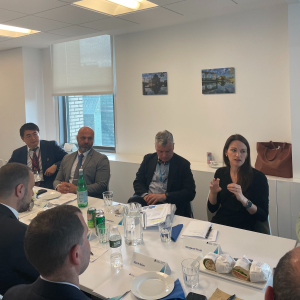More than half of the world’s population lacks access to essential health services. Progress on Sustainable Development Goal (SDG) 3 (ensure healthy lives and promote well-being for all at all ages) lags far behind following the Covid-19 pandemic and other crises which exacerbate existing health inequalities.
Overcoming setbacks and addressing longstanding shortcomings in healthcare provision requires bottom-up innovation led by communities, as well as urgent action from the international community. SDG Target 3.8 specifically aims to achieve universal health coverage (UHC), including access to safe, effective, quality and affordable essential medicines and vaccines for all, by 2030.
Accelerating progress on SDG 3 calls for the right balance of multi-stakeholder partnerships, innovation, funding and capacity building.
To explore the nexus of community healthcare and science, technology and innovation, KAS New York held an expert discussion drawing on the diverse experience of the United Nations system, Member States, the private sector and civil society.
The expert discussion highlighted the following considerations for policymakers:
- A need for genuine political will, driven by self-interest, to promote universal health coverage (UHC). Sustainable health coverage is an imperative for the security of all countries, as global health is a shared global good.
- The importance of applied and practical scientific research that involves doctors and end-users from the start. Engaging doctors and other stakeholders in the design of new solutions will help to ensure their sustainability.
- The central role of governments in creating a vision for health systems and in fostering private sector innovation. Governments are often the gatekeepers of public health institutions, and are central to providing health care services.






